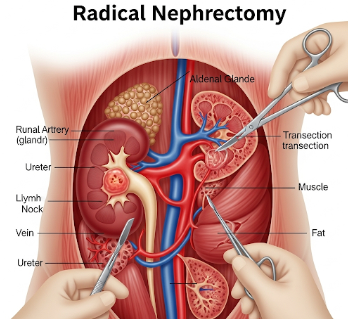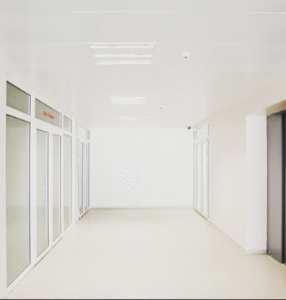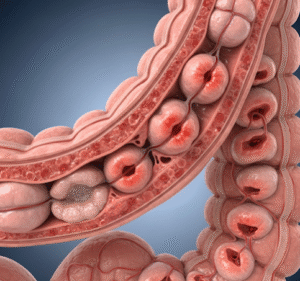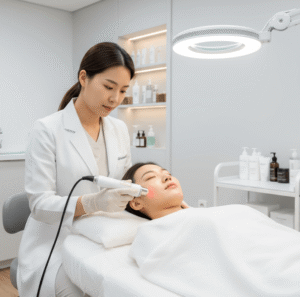Overview
Radical nephrectomy is a surgical procedure to remove an entire kidney along with surrounding tissues, including the adrenal gland, perinephric fat, and sometimes regional lymph nodes. It is most commonly performed to treat kidney cancer or other malignant kidney tumors.
South Korea is recognized for advanced urological surgery, minimally invasive techniques, and experienced surgical teams, making radical nephrectomy safe, effective, and with optimal long-term outcomes.
What is Radical Nephrectomy?
Radical nephrectomy involves complete removal of the affected kidney along with surrounding supportive structures to ensure complete tumor excision. Key points include:
✔ Primary treatment for localized kidney cancer.
➔ Removes kidney, adrenal gland, and perinephric fat for comprehensive cancer control.
● Minimally invasive options: Laparoscopic or robotic radical nephrectomy available.
★ Effective long-term outcomes: High survival rates for localized tumors.
This procedure is recommended for patients with kidney tumors that are large, centrally located, or not amenable to partial nephrectomy.
What are the Benefits?
Radical nephrectomy offers several advantages:
✔ Complete removal of malignant kidney tumors.
➔ Reduces risk of local recurrence.
● Minimally invasive approaches allow faster recovery.
★ Improves long-term survival for patients with localized kidney cancer.
➤ Provides definitive treatment when partial nephrectomy is not feasible.
Procedure Details
1) How should I prepare for Radical Nephrectomy?
Preparation ensures safety and optimal results:
✔ Medical assessment: Blood tests, imaging (CT, MRI), and kidney function evaluation.
➔ Medication review: Adjust or stop blood thinners or other medications as advised.
● Preoperative counseling: Discuss surgical risks, alternatives, and recovery expectations.
★ Anesthesia evaluation: Ensure fitness for general anesthesia.
➤ Lifestyle adjustments: Smoking cessation and optimization of chronic conditions such as hypertension or diabetes.
2) What happens during the procedure Radical Nephrectomy?
Radical nephrectomy can be performed via open, laparoscopic, or robotic approaches under general anesthesia:
✔ Incision: Large flank incision for open surgery or small abdominal/retroperitoneal ports for minimally invasive surgery.
➔ Kidney mobilization: Kidney is carefully separated from surrounding tissues.
● Removal: Kidney, adrenal gland (if indicated), perinephric fat, and regional lymph nodes are excised.
★ Closure: Incisions closed with sutures; drains may be placed to prevent fluid accumulation.
➤ Procedure duration: Typically 2–4 hours depending on technique and tumor complexity.
Korean urologists emphasize precision, careful tissue handling, and minimally invasive techniques to optimize outcomes and reduce complications.
3) What happens after Radical Nephrectomy?
Post-operative care focuses on recovery, pain control, and monitoring kidney function:
✔ Hospital stay: 3–7 days depending on surgery type.
➔ Pain management: Analgesics, often with patient-controlled options.
● Activity restrictions: Gradual mobilization; avoid heavy lifting for 4–6 weeks.
★ Follow-up: Regular monitoring of remaining kidney function, imaging for recurrence, and labs for renal function.
➤ Long-term outlook: Most patients lead normal lives with one functioning kidney.
Risks / Benefits
Possible Risks:
✔ Bleeding during or after surgery
➔ Infection at surgical site or urinary tract
● Injury to surrounding organs (spleen, pancreas, liver, intestines)
★ Blood clots or pulmonary complications
➤ Rare decrease in kidney function leading to chronic kidney disease
Major Benefits:
✔ Complete removal of malignant kidney tumors
➔ Reduces recurrence risk
● Minimally invasive approaches shorten recovery and hospital stay
★ High long-term survival rates for localized kidney cancer
➤ Definitive treatment when partial nephrectomy is not suitable
Recovery and Outlook
✔ Immediate recovery: Vital signs and urine output monitored closely.
➔ Hospital stay: 3–7 days; laparoscopic/robotic surgery usually shorter.
● Activity: Light activity after 1–2 weeks; return to normal after 4–6 weeks.
★ Pain management: Gradual reduction of analgesics as healing progresses.
➤ Long-term outcome: Single kidney can maintain adequate function; regular follow-up for cancer surveillance is essential.
When To Call the Doctor
Contact your doctor immediately if you notice:
✔ Fever or signs of infection
➔ Persistent pain or swelling at the surgical site
● Decreased urine output or blood in urine
★ Shortness of breath, chest pain, or leg swelling (possible blood clot)
➤ Unusual fatigue, nausea, or abdominal distension
Best Korea Option / Process
South Korea provides expert radical nephrectomy services with:
✔ Leading hospitals: Samsung Medical Center, Asan Medical Center, Seoul National University Hospital.
➔ Minimally invasive laparoscopic and robotic surgery options for reduced hospital stay and faster recovery.
● Experienced urologic surgeons: Skilled in complex kidney tumor resections.
★ Comprehensive care: Pre-op evaluation, surgery, post-op monitoring, and long-term cancer surveillance.
➤ Medical tourism support: Translation, appointment coordination, and continuity of care for international patients.
✅ Highlights:
✔ Radical nephrectomy removes the entire kidney for treatment of kidney cancer
➔ Minimally invasive approaches reduce recovery time and hospital stay
● Reduces risk of recurrence and improves long-term survival
★ Risks include bleeding, infection, injury to surrounding organs, and reduced kidney function
➤ Korean hospitals provide expert surgeons, advanced techniques, and comprehensive perioperative care













